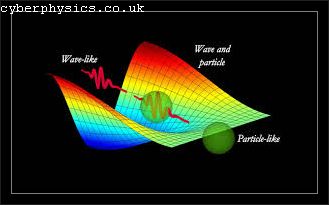The foundation of quantum mechanics

Quantum mechanics is the study of the physics of small objects, particularly, atoms. The laws of physics on our human scale is not necessarily difficult to understand. Newton's laws describe quite accurately the physics of our world on the larger scale. However, when looking closely at the behavior of small particles, the laws we are acustomed to cease to be useful
Governing Principles

There are three governing principles that embody quantum mechanics. The first is that the properties of particles are quantized. This means that characteristics, for example, speed, don't occur on a smooth continuum, but only when certain dependencies are met.
The second principle is that light sometimes behaves as a particle and as a wave. For many years, light was found to act as a wave, where peaks create brighter light, and troughs was where the light canceled out, creating darkness. Later, light was found to also behave as a particle. Phenomena such as the photoelectric effect could only be described in terms of particle nature.
The third principle reveals that all matter acts as a wave as well as particles, which completely debunked the theory that all particles, such as electrons exhibited only particle-like properties. This means that measurments for properties such as momentum and position cannot be known with certainty, but only their probabilities can be known.